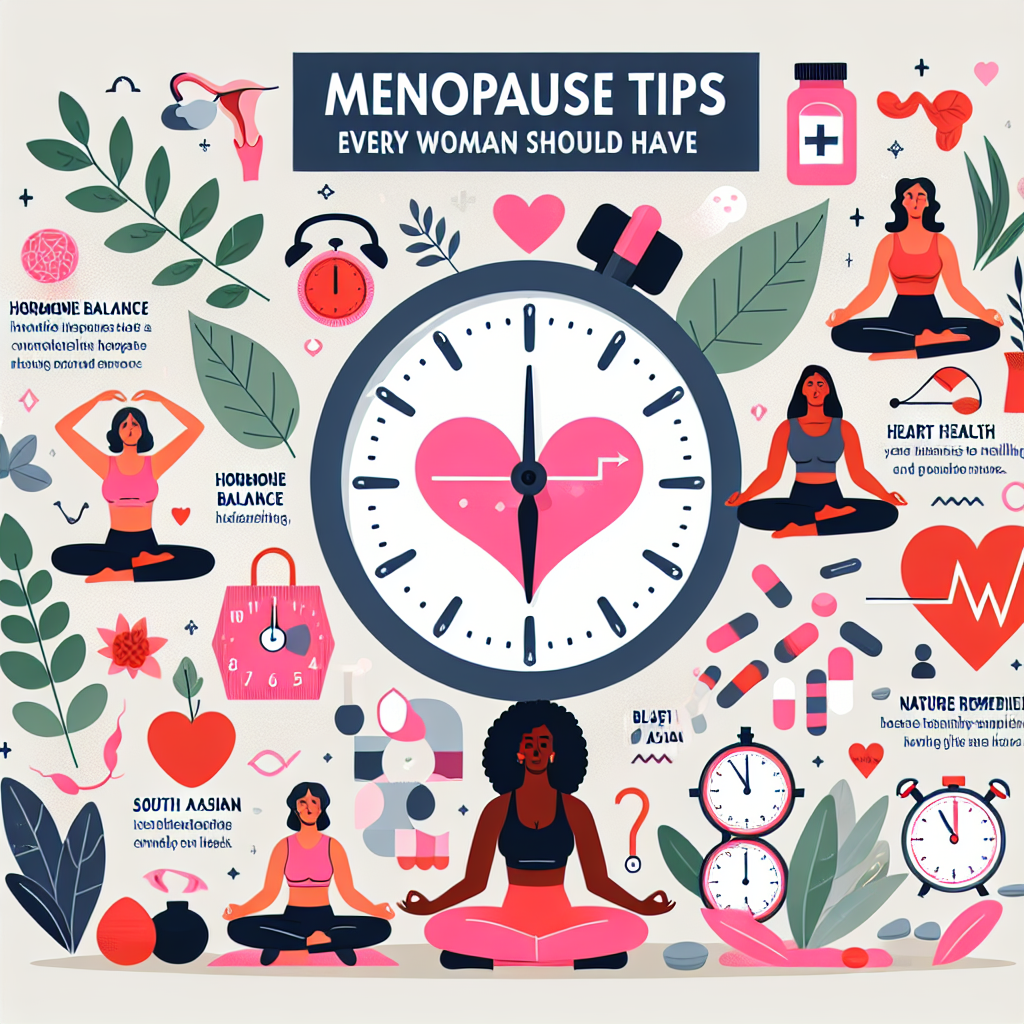Menopause Tips Every Woman Should Know

Discover essential Menopause Tips Every Woman Should Know. Empower yourself with knowledge and navigate this natural phase of life with confidence. Click here to learn more.
Understanding and Managing Menopause Symptoms: Essential Tips for Every Woman
Menopause is a natural biological process that marks the end of a woman’s menstrual cycles. It is a significant milestone in a woman’s life, signifying the end of her reproductive years. However, the transition to menopause is not always smooth sailing. It is often accompanied by a range of symptoms that can be challenging to manage. Understanding these symptoms and knowing how to manage them effectively can significantly improve a woman’s quality of life during this period.
The onset of menopause typically occurs in a woman’s late 40s or early 50s, although it can happen earlier or later. It is characterized by a decrease in the production of the hormones estrogen and progesterone, which regulate the menstrual cycle. This hormonal shift can lead to a variety of symptoms, including hot flashes, night sweats, mood changes, sleep disturbances, and vaginal dryness.
Hot flashes, a sudden feeling of warmth that spreads over the upper body, are among the most common symptoms of menopause. They can be mild or severe and can occur at any time of the day or night. To manage hot flashes, it can be helpful to identify and avoid potential triggers, such as spicy foods, caffeine, and alcohol. Dressing in layers and keeping a fan or air conditioner handy can also help to alleviate discomfort.
Night sweats, which are hot flashes that occur during sleep, can disrupt a woman’s sleep cycle and lead to fatigue and irritability. To combat night sweats, consider using moisture-wicking sleepwear and bedding, and maintain a cool, comfortable sleeping environment.
Mood changes, including irritability, anxiety, and depression, are also common during menopause. These can be managed through regular exercise, which has been shown to boost mood and reduce anxiety. Additionally, mindfulness practices such as yoga and meditation can help to alleviate stress and promote emotional well-being.
Sleep disturbances, such as insomnia, are another common symptom of menopause. To improve sleep quality, it can be beneficial to establish a regular sleep schedule, create a relaxing bedtime routine, and make the sleeping environment as comfortable as possible.
Vaginal dryness, which can lead to discomfort during sexual intercourse, is another symptom that many women experience during menopause. Over-the-counter lubricants and moisturizers can help to alleviate this symptom. If these measures are not sufficient, a healthcare provider may recommend hormone therapy or other treatments.
In addition to these strategies, maintaining a healthy diet and lifestyle can also help to manage menopause symptoms. Consuming a balanced diet rich in fruits, vegetables, lean proteins, and whole grains can help to maintain hormonal balance and promote overall health. Regular physical activity can also help to alleviate symptoms and improve mood and energy levels.
Finally, it’s important to remember that menopause is a natural part of life, not a disease or a disorder. While its symptoms can be challenging, they are manageable with the right strategies and support. By understanding the changes that are occurring in your body and taking proactive steps to manage your symptoms, you can navigate this transition with confidence and grace.
In conclusion, menopause is a significant phase in a woman’s life that comes with its unique set of challenges. However, with understanding, self-care, and the right management strategies, it is possible to navigate this period with minimal discomfort and maintain a high quality of life.
Navigating Through Menopause: Health and Lifestyle Changes Every Woman Should Know

Menopause is a natural biological process that marks the end of a woman’s menstrual cycles. It is a significant milestone in a woman’s life, signifying the end of her reproductive years. However, the transition to menopause can be challenging, with various physical and emotional changes. Therefore, it is essential for every woman to be well-informed and prepared to navigate through this phase of life with grace and ease.
Firstly, understanding the process of menopause is crucial. Menopause typically occurs in women in their late 40s or early 50s, although it can happen earlier or later. It is diagnosed after a woman has gone 12 months without a menstrual period. The period leading up to menopause, known as perimenopause, can last for several years and is characterized by irregular periods and symptoms such as hot flashes, night sweats, sleep problems, and mood changes.
One of the most effective ways to manage these symptoms is through lifestyle modifications. Regular physical activity is highly recommended as it helps to maintain a healthy weight, reduce stress, improve sleep, and boost mood. A balanced diet rich in fruits, vegetables, lean proteins, and whole grains can also help manage weight and provide the necessary nutrients for overall health. Limiting intake of caffeine and alcohol, which can trigger hot flashes and disrupt sleep, can also be beneficial.
Another critical aspect of navigating through menopause is maintaining good mental health. The hormonal changes during menopause can lead to mood swings, anxiety, and depression. Therefore, it is essential to prioritize self-care and stress management. This can include activities such as yoga, meditation, deep breathing exercises, or any other relaxation techniques that work best for you. It’s also important to stay socially connected with friends and family and seek professional help if needed.
Hormone replacement therapy (HRT) is another option for managing menopause symptoms. HRT involves taking medications containing female hormones to replace the ones the body no longer makes after menopause. It can be highly effective in relieving hot flashes and night sweats and preventing bone loss. However, HRT is not suitable for everyone and can have side effects and risks. Therefore, it’s important to discuss this option with your healthcare provider to determine if it’s right for you.
Regular health check-ups are also crucial during menopause. Women undergoing menopause are at a higher risk of certain health conditions such as heart disease and osteoporosis. Regular screenings and check-ups can help detect these conditions early and initiate timely treatment.
Lastly, it’s important to remember that menopause is a natural part of life and not a disease or a disorder. It’s a time of transition, not an end. With the right knowledge, support, and care, it can be a time of growth and positive change.
In conclusion, navigating through menopause requires understanding the process, making necessary lifestyle changes, maintaining good mental health, considering treatment options, and staying on top of your health. It’s a journey that every woman goes through, and with the right approach, it can be a positive and empowering experience.
Surviving Menopause: Top Tips and Strategies for Women
Menopause is a natural biological process that marks the end of a woman’s menstrual cycles. It is a significant milestone in a woman’s life, signifying the end of her reproductive years. However, the transition to menopause can be challenging, with various physical and emotional changes that can significantly impact a woman’s quality of life. Therefore, it is crucial for women to be well-informed and prepared to navigate this phase of life with grace and resilience. Here are some essential tips and strategies every woman should know to survive menopause.
Firstly, understanding the process of menopause is fundamental. Menopause typically occurs in women in their late 40s or early 50s, but the age can vary. It is diagnosed after a woman has gone 12 months without a menstrual period. The period leading up to menopause, known as perimenopause, can last for several years and is characterized by irregular periods and other symptoms such as hot flashes, night sweats, sleep problems, and mood changes. By understanding these changes, women can better anticipate and manage the symptoms.
Secondly, maintaining a healthy lifestyle is crucial during menopause. Regular physical activity can help manage menopause symptoms such as weight gain, mood swings, and sleep problems. It also reduces the risk of heart disease and osteoporosis, which increases after menopause. A balanced diet rich in fruits, vegetables, lean proteins, and whole grains can also help manage weight and provide essential nutrients. Limiting intake of caffeine and alcohol can help manage hot flashes and improve sleep.
Thirdly, it’s important to prioritize mental health. The hormonal changes during menopause can lead to mood swings, anxiety, and depression. Therefore, it’s essential to practice stress management techniques such as meditation, deep breathing exercises, and yoga. Connecting with friends and family, joining support groups, or seeking professional help can also provide emotional support and help cope with the changes.
Fourthly, regular health check-ups are essential during and after menopause. Women should have regular screenings for breast cancer, heart disease, bone density, and other health issues. Regular check-ups can help detect any health problems early and provide timely treatment.
Lastly, hormone replacement therapy (HRT) can be an effective treatment for severe menopause symptoms. HRT involves taking medications containing female hormones to replace the ones the body no longer makes after menopause. However, HRT is not suitable for everyone and can have side effects. Therefore, it’s important to discuss the benefits and risks with a healthcare provider.
In conclusion, menopause is a significant phase in a woman’s life that brings about various physical and emotional changes. However, with the right knowledge and strategies, women can navigate this phase with resilience and grace. Understanding the process, maintaining a healthy lifestyle, prioritizing mental health, having regular health check-ups, and considering treatments like HRT can help manage menopause symptoms and maintain overall health and well-being. Remember, menopause is not an illness but a natural phase of life. With the right approach, it can be a time of growth, liberation, and new beginnings.